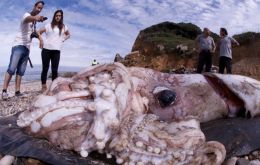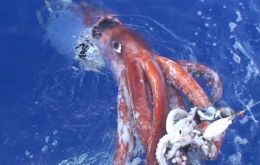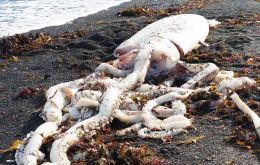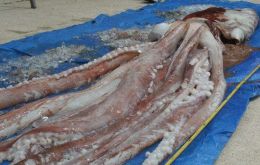MercoPress. South Atlantic News Agency
Tag: giant squid
-
Wednesday, April 16th 2025 - 22:57 UTC
The giant squid trawled by Falklands’ vessel preserved at London’s Natural History Museum

In February 2006, a 8.62 meters giant squid caught off the Falkland Islands April 2005 went on public display at the Natural History Museum in London. Researchers at the museum undertook a painstaking process to preserve the giant creature, which is on display in a 9m long glass tank immersed in a mix of salt water and formalin.
-
Thursday, June 27th 2019 - 09:00 UTC
Giant squid filmed in the Gulf of Mexico, some 100 miles from New Orleans

On June 19, Nathan Robinson was on board a research vessel in the Gulf of Mexico, surveying footage taken by the Medusa, a deep sea camera system. Shrimp, jellyfish, lantern sharks—the usual suspects—floated across the screen. But then, something utterly unusual crept into view: a tubular creature that suddenly unfurled its tentacles, wrapping them around the Medusa. Robinson raced to alert his colleagues to what he thought he had seen: a giant squid.
-
Saturday, December 29th 2018 - 08:25 UTC
Bill only allowing jigging to capture giant squid triggers controversy in Chile

The Chilean Association of Fishing Industry (ASIPES) has expressed its “absolute concern” following the approval of a bill modifying the General Fisheries and Aquaculture Act, limiting the capture of the giant squid (Dossidicus gigas) to jigging or hand lining.
-
Wednesday, March 1st 2017 - 21:11 UTC
Aquazul: a giant squid sausage with more protein and less fat rich in Omega-3

A new unique food product was created by scientists at the Center for Research in Food and Development (CIAD) of Mexico: a protein-rich squid sausage and omega 3, which has up to 70% less fat, in addition to natural dyes and preservatives.
-
Thursday, March 10th 2016 - 21:28 UTC
Catches of Peruvian giant squid are showing a slow recovery: shift of oceans winds

Catches of Peruvian giant squid (Dosidicus gigas) are showing a slow recovery, something that has long been awaited not only by local fishermen and industrialists, but also by the largest processors in Europe and Asia.
-
Saturday, May 16th 2015 - 08:41 UTC
Giant washed-up squid found on NZ beach displayed at Kaikoura aquarium

A local aquarium in New Zealand reported that a giant washed-up squid has been found on a beach at South Bay in Kaikoura. Reportedly, a man—who was out with his dog for a stroll at the beach—accidentally stumbled upon the marine creature with long tentacles.
-
Thursday, September 18th 2014 - 02:55 UTC
NZ scientists examine giant squid caught in Antarctica' Ross Sea

It was a calm morning in Antarctica's remote Ross Sea, during the season when the sun never sets, when Capt. John Bennett and his crew hauled up a creature with tentacles like fire hoses and eyes like dinner plates from a mile below the surface. A colossal squid: 350 kilograms, as long as a minibus and one of the sea’s most elusive species.
-
Thursday, October 3rd 2013 - 11:03 UTC
Giant squid washes ashore in the Cantabrian Sea; conservation plans

The Cantabrian Maritime Museum (MMC) in the north of Spain has concluded the conditioning for its conservation of a giant squid that was found washed ashore in a beach of Asturias and which was catalogued as an adult female of the cephalopod “Architeuthis Dux” specie weighing 180 kilos and with a total length of eight metres.
-
Friday, November 18th 2011 - 21:55 UTC
Humboldt squid spawn earlier and migrate for food under influence from El Niño

Stanford University marine biologist William Gilly and other researchers have been studying Humboldt squid in Mexico's Sea of Cortez to determine why the animals have been spawning at a much younger age and smaller size than usual.
-
Friday, July 1st 2011 - 13:00 UTC
Fishermen recover giant dead squid off Florida coast

A trio of fishermen in the US state of Florida said they made an unusual find about 12 miles off the coast of Jensen Beach -- a dead giant squid measuring 23- to 25 feet.
